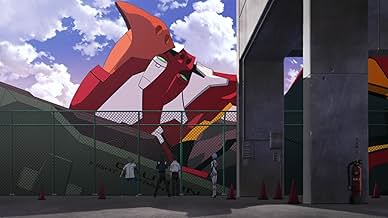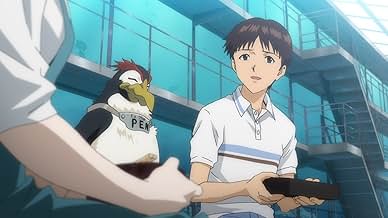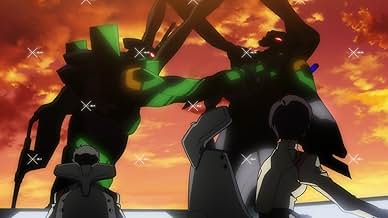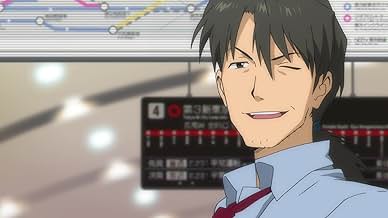Evangelion: 2.0: You Can (Not) Advance
Füge eine Handlung in deiner Sprache hinzuIn the face of increasingly bizarre and powerful Angel attacks, Shinji Ikari and his partner Rei Ayanami are assisted by two new pilots: the fiery Asuka Langley Shikinami and the mysterious ... Alles lesenIn the face of increasingly bizarre and powerful Angel attacks, Shinji Ikari and his partner Rei Ayanami are assisted by two new pilots: the fiery Asuka Langley Shikinami and the mysterious Mari Illustrious Makinami.In the face of increasingly bizarre and powerful Angel attacks, Shinji Ikari and his partner Rei Ayanami are assisted by two new pilots: the fiery Asuka Langley Shikinami and the mysterious Mari Illustrious Makinami.
- Auszeichnungen
- 1 Gewinn & 2 Nominierungen insgesamt
- Misato Katsuragi
- (Synchronisation)
- Shinji Ikari
- (Synchronisation)
- Rei Ayanami
- (Synchronisation)
- …
- Asuka Langley Shikinami
- (Synchronisation)
- Gendo Ikari
- (Synchronisation)
- Ritsuko Akagi
- (Synchronisation)
- Mari Illustrious Makinami
- (Synchronisation)
- Maya Ibuki
- (Synchronisation)
- Ryoji Kaji
- (Synchronisation)
- Kouzou Fuyutsuki
- (Synchronisation)
- Makoto Hyuga
- (Synchronisation)
- Shigeru Aoba
- (Synchronisation)
- Kensuke Aida
- (Synchronisation)
- Toji Suzuhara
- (Synchronisation)
- Kiel Lorenz
- (Synchronisation)
- Hikari Horaki
- (Synchronisation)
- Kaworu Nagisa
- (Synchronisation)
- Additional Voices
- (English version)
- (Synchronisation)
Empfohlene Bewertungen
Story was very good and took a interesting turn compared to the series and oh my did I love it. With it somehow a good pacing which was consistent. They added and removed some scenes and changed up the dialouge quiet a bit and these were all changes that I was pretty happy with. The city scenes which just made the world feel so much more alive and real. And they removed some of the "disturbing" scenes which I was fine with. The transitions between atmospheres were well done, one moment they are upbeat and happy and the next they are sad and lost but it's not in an instant, they do it gradually. Also they add some new worldbuilding details.
Asuka's characterization is a bit different in rebuild and I mean a good different she seems far less annoying and has some new traits that make her quiet different from the original. And we are introduced to a new character that wasnt in the rebuild which is Mari and even though she probably had the least screentime she was a very interesting character and the oddball from the rest of the pack. We also get some new background details on some of the characters and some changes to characters's relationships.
The visuals and music were well done. The animation, the lighting it was pretty much in par with the prequel but a bit better especially with the action scenes which were awesome. Though I hate Unit 00's color scheme. The music was quiet different in this movie and it had a more upbeat and chill vibe to it though some of the action scenes's music was just crazy and hype and the songs were well picked.
Overall a very enjoyable movie. Somehow similar yet different to the series. They certainly invested the audience emotionally in a different way compared to the series and they did it excellently.
A strong second entry in the Rebuild of Evangelion, even if I'm not 100% sold on some of the changes
The second film in Hideaki Anno's Rebuild of Evangelion, Evangelion: 2.0 You Can (Not) Advance covers the material from episodes 8-19 of the TV series but also is the part where the rebuild begins to veer away from its source material. A post credit scene in Evangelion: 1.0 You Are (Not) Alone showing the awakening of Kaworu Nagisa was a telling sign of Anno's intent on creating new spins on the series characters and would not be beholden to the layout as presented in the original series. While the characters remain mostly intact, Anno takes them through different directions story wise as well as expanding and adjusting the character and story progression to meet the needs of feature film format. For the most part the movie does this very well, but there are a few hiccups in the translation.
If there's a central theme present in You Can (Not) Advance, it's in Shinji's relationship with his father, Gendo. The story begins proper with Shinji and Gendo visiting Yui Ikari's (Shinji's mother and Gendo's wife) grave, it effectively establishes the dynamic in Shinji and Gendo's estrangement with Shinji having processed his grief with feelings with isolation, inadequacy and worthlessness, and Gendo having sever ties to things he considers "frivolous" down to the fact Gendo has discarded any photos or mementos of Yui's existence which is yet another point of unspoken contention in their relationship. Shinji's complicated relationship with his father is further examined via his relationships with characters such as Asuka and Rei, who both give their input to Shinji in different ways. Asuka's abrasive personality is mostly in tact here, but admittedly it has had its edges softened in comparison to the TV series with remixes on scenes such as her sleeping in Shinji's room now with added exchanges including Asuka exhibiting a greater level of vulnerability in not just this scene, but also a remix of the elevator scene with Rei.
While the movie mostly gets the major story developments right and the new elements presented are mostly unintrusive, there are some stumbling points that I was disappointed by. For those familiar with the original series, the two most horrific scenes by far from that show involved were in regards to episodes 18 and 19 with Eva Unit 1's brutal evisceration of Angel hijacked Eva Unit 3 or Eva Unit 1's devouring of the Angel Zeruel. While both scenes are still present, the soundtrack choice of what sounds like a children's choir in place of the original score doesn't fit all that well and I found it had the effect of lessening the impact of these sequences. In the case of the Zeruel scene there's also been a major change for the sake of I guess making it feel like a suitable ending climax which I suppose makes sense to a degree, but I'm not sure where I fall on liking or disliking the direction.
Evangelion: 2.0 You Can (Not) Advance continues Anno's Rebuild of Evangelion revisiting and remixing elements with contemporary polish and designs. While the character dynamics are on point with some good expansions on Shinji's relationships with Rei and Asuka in particular yielding some strong emotional pathos, certain presentational decisions I felt called attention to themselves and lessened their impact. Overall Evangelion: 2.0 is a worthy entry in the series and makes for satisfying if flawed viewing for series veterans and franchise newcomers.
Evangelion 2.0 is a much bigger departure from the original series than the first movie was, and it's an incredible anime feature, as a result. Everything is bigger and better, and it feels much more like a movie than just a collection of episodes.
The animation is once again fantastic, the new battle scenes and Angel designs are impressive, and all the story/character additions and character changes are absolutely for the best. The writing and flow of the story has been notably improved, to the benefit of all of the main characters. I also have to mention how great the music is; it serves as a perfect compliment and counter-point to what's happening on screen, and at times demands as much of your attention as the visuals do.
Casual Evangelion fans, die-hards, and newcomers should not hesitate to check out these movies. It's completely accessible to a new audience, while retaining and expanding upon the core of why this series is one of the most popular and influential. I'm no Evangelion fanatic, but I can't deny the quality of what I'm seeing in progress. 1.0 was great, and 2.0 is fantastic. I CANNOT wait to see where the third movie takes us, next. This is one of the best movies (animated or otherwise) that I've seen in quite a while.
Evangelion 2.0: You Can (Not) Advance (or 2.22 depending on the version you saw) is the most successful interpretation of Evangelion thus far. While the first remake film 1.0: You Are (Not) Alone felt much like a mere recap of the first six episodes of the series, the second film takes a different approach and reaches a remarkable level of success. Everything is smoother, more refined and simply better.
The animation is gorgeous. The plot is more understandable. The characters are actually all likable this time. Many elements of the story are different, and the pretentious biblical gibberish seems to have taken a back seat. There is also warmth that was largely missing in the series: the characters seem to be genuinely content with their lives. Shinji isn't constantly mumbling about hating himself. Rei isn't a completely emotionless robot. Even Gendo seems more human. As a very small, but important detail we see his eyes through his shades far more than in the series, which may not sound like much, but it really makes a difference if you've watched the series.
The story remains mostly the same. The events cover mostly what happens in the episodes 7-19 of the series, but with all the filler cut out. Only the most meaningful angel battles are left. Instead of feeling episodic like the first film, 2.0 actually feels like a proper movie with appropriate highs and lows and character development, culminating in a huge climax which is one of the most exciting action sequences ever seen in animation.
The animation is top of the class. The level of detail is simply eye- popping, especially when watched in HD. With the help of CGI the angel battles look cooler than ever, and the evas are particularly impressive. The fairly simplistic characters are something of a letdown in comparison, but don't drag the overall presentation down.
The sound is also vastly improved from the series. The music this time is appropriately epic, matching the scale and size of the evas and angels. The voice acting is on par with the series with most of the original cast reprising their roles. The ending song, an acoustic version of Utada Hikaru's "Beautiful World" feels perfect for the film, as if letting out a sigh of relief yet still leaving the feeling there's more to come.
Yet there are still problems Evangelion can't seem to get rid of. The biblical imagery and names, though downplayed in this film, still feel somewhat goofy and superficial. Though the plot is more coherent, it still is very weird and it can be hard to grasp what exactly the big picture is. There is some weird dialogue and lines like "Do you hate pain?". Still, the rest of the film is good enough that the viewer is willing to overlook most of the flaws.
Evangelion 2.0 is the best interpretation of the series thus far, and it left me eagerly waiting for more. I recommend seeing the 2.22 version, as it gives more insight to the characters and story. Highly recommended for both fans of the series and newcomers alike.
Here, we're treated to a scene that's brand new. Where the first film followed the series with about 80% accuracy, from the get-go here we're treated to a major change, and a greater split starting around halfway through. This is where the rebuilds begin to lift the curtain, and slowly unravel where the series is going. I really liked it.
The animation here is gorgeous. 3D for the machinery and logistical aspects of the city allow them to show a lot more than the original series. And the 2D elements on top blend in very well. It's not the 90s anymore, the merging of styles looks great.
However the new character that's introduced is rather shallow. She's interesting retroactively, but she still marred my first viewing experience. I didn't really understand why she was taking over character actions from the original series-actions that could be done by the actual original characters within this very film. But it was really the only slight on the story (excluding the convoluted nature that's just an Evangelion trademark at this point).
Overall, this film justifies the rebuilds existence much more than the first one. It's what I've come to expect when an original creator revisits an earlier work. I want to see their adaptation of what they want to show after having grown, and maturing.
There's a similar instance with the Final Fantasy VII remake. If it's the original writer/s, let them shake things up. It's much more interesting.
Wusstest du schon
- WissenswertesIn the many changes that the original plot had, the most dramatic changes are: In the anime, when the girls are in an elevator, Asuka slaps Rei for their passivity, while in this film, she tries to slap her and Rei stops the slap with her hand. In the series, Shinji only threatens to destroy the Geo-front, in the film, he does manage to meet this threat and he is seen destroying part of the Geo-front. Toji's younger sister is seen fully recovered in the film, but in the series, the fate of her is never know. In the film, Asuka is much more open with Shinji. For example, the scene of the series in which she lies beside him, she falls asleep and Shinji moves away, but the film she stays in bed and they counted each other's fears, with greater harmony between them that at other times. In the series, when the EVA-01 match against Zeruel, EVA-01 goes into Berserk mode alone, while in the film, Shinji does so at their own will. In the the series the EVA-01 also rebuilds the lost arm with a piece of Zeruel's ripped body, while in the film, the EVA 01 creates a sort of "condensed energy arm" which is also used as "cannon momentum" against Zeruel.
- PatzerMari is supposed to be British, but in the scene where she speaks in English, the accent is American.
- Zitate
Unit-01 Dummy Plug System: [during start-up, in reverse] Freedom is an illusion. All you will lose is the emotion of pride. To be dominated by me is not as bad for human pride as to be dominated by others of your species.
- Crazy CreditsAt the end of the credits, there is a scene where EVA-01 is pierced with the LLance of Longinus, thrown by Kaworu Nagisa piloting the Evangelion Mark.06, who says that he will show Shinji "true happiness."
- VerbindungenFollowed by Evangelion: 3.0: You Can (Not) Redo (2012)
- SoundtracksBeautiful World -PLANiTb Acoustica Mix
Performed by Hikaru Utada
Top-Auswahl
Details
- Erscheinungsdatum
- Herkunftsland
- Sprachen
- Auch bekannt als
- Evangelion: 2.0 You Can (Not) Advance
- Produktionsfirmen
- Weitere beteiligte Unternehmen bei IMDbPro anzeigen
Box Office
- Bruttoertrag in den USA und Kanada
- 133.640 $
- Eröffnungswochenende in den USA und in Kanada
- 84.157 $
- 23. Jan. 2011
- Weltweiter Bruttoertrag
- 41.780.025 $
- Laufzeit
- 1 Std. 52 Min.(112 min)
- Farbe
- Sound-Mix
- Seitenverhältnis
- 1.85 : 1







































